Kitchen Voyeur with Dr. Wagner: Episode V.
Buckwheat: A Deeply Flavorful, Gut-Friendly and Eco-Friendly Alternative to Grain.
Buckwheat is not wheat. It's not even a cereal grain; it's a fruit seed related to rhubarb and sorrel. That's why it's great for people who are sensitive to wheat and gluten-containing grains.
A few years ago, my sister-in-law (who hails from the Republic of Georgia) introduced me to buckwheat. I should say she re-introduced me, because the Wagners can trace their ancestry back to German settlements along the Volga River of Russia, where life without buckwheat would have been "like the South without grits. Or the Middle East without falafel," as Karoun Demirjian puts it. This heart-shaped seed is now (once again) part of my foundations for food, energy, and health.
Buckwheat is so tasty and provides so many health benefits and so many ecosystem services that I'm curious how it ever became obscure in America. We'll save that inquiry for another day, however. Because the question of how immigrants can become exiled from their ancestral cuisine, is a topic unto itself.
Let's dig in to some hot buttered buckwheat.
Health Benefits of Buckwheat:
-
Gluten-Free.
-
Cardioprotective.
- Diets high in buckwheat have been linked to lowered risk of developing heart disease.
- Buckwheat is rich in flavonoids, particularly rutin. Flavonoids are phytonutrients that protect against many diseases by extending the action of vitamin C and acting as anti-inflammatory antioxidants. Cardiovascular disease is now thought to be largely a disease of inflammation.
- Buckwheat is also a good source of magnesium. This mineral relaxes blood vessels, thereby lowering blood pressure while improving blood flow and nutrient delivery to cardiac tissue. Also, Magnesium stabilizes the electrical system of the heart, lowering the risk of irregular heartbeat.
-
Prevents Gallstones.
- Buckwheat is high in insoluble fiber, which improves bowel transit time—in other words, it makes you poop easily and more often. Faster gut transit time may optimize bile flow from the gallbladder and keep bile from sludging, or condensing into gallstones. For every 5 grams of insoluble fiber you consume per day, you decrease your risk of gallstones by 10%.
-
Good for Your Gut Microbiome.
- Buckwheat is also high in MACs—Microbiome Accessible Carbohydrates. These are the various soluble and insoluble fibers and resistant starches that bypass human digestion and feed the friendly bugs in your colon. You've heard of probiotics—the good bugs. MACs are prebiotics, the preferred meal for your probiotics. A healthy gut microbiome is crucial to helping you avoid inflammation, obesity, allergy, asthma, autoimmunity, emotional ups and downs, gut infections, diabetes, and probably more.
- Buckwheat is considered low-FODMAP by most authorities, making it generally appropriate for people with Irritable Bowel Syndrome. Assess tolerance.
-
Helps Regulate Blood Sugar.
- Buckwheat groats are not only high in fiber but in protein as well. They contain all eight essential amino acids, including lysine, and they score very high on their ability to satisfy hunger. When you eat buckwheat, the combination of fiber, protein, and satiety factors promotes a more stable blood sugar response compared with other whole-kernel carbohydrate sources, such as white rice (or even brown rice).
- The glycemic load for buckwheat groats is only 14. Astonishingly low.
Ecosystem Services:
-
Pollination.
- Buckwheat produces very fragrant white flowers that attract bees by the million. The honey produced from these blossoms is a special, strongly flavored, dark honey, which is coveted all by itself, not to mention the pixy-dust pollination services to the environment.
-
Soil Enrichment & Sustainability.
- Buckwheat is a cover crop that restores and liberates nutrients in the soil. It also naturally breaks the pest and weed cycles that plague monocrops—cycles that gain unholy momentum under the non-rotational management tactics of Big Ag. Planting buckwheat gives the soil back to itself. And it decreases the need for herbicides and pesticides on future crops.
- According to Cornell University College of Agriculture and Life Sciences "Buckwheat is...useful for weed suppression. It also mellows the soil while improving aggregate stability...bringing idle land back into production. Buckwheat does well in low-fertility soils. It is a scavenger of phosphorus and calcium and mineralizes rock phosphate, making these nutrients available for later crops."
Where to Buy:
- Currently, I prefer Russian kasha; it has slightly larger kernels that seem to hold their shape and structure better when you cook them, than American varieties I've tried. Let me know if you find a domestic buckwheat you like. I'd love to find one myself.
Serving Suggestions:
- Roasted buckwheat groats are called "kasha". They are earthier and nuttier than the unroasted groats. Personally, I like my buckwheat roasted. Allowing the buckwheat to spend a few minutes pan-roasting in butter, as shown in the above video, adds delicious complexity to the flavor.
- For a change of pace, try buckwheat as a hearty breakfast cereal.
- Add cooked buckwheat to soups or stews to give them a hardier flavor and deeper texture.
- Add chopped chicken, garden peas, pumpkin seeds and scallions to cooked and cooled buckwheat for a delightful lunch or dinner salad.
- Sauté carrots, onion, and celery to make a French mirepoix. Then add your roasted buckwheat groats and water. Simmer till cooked. Enjoy a nice nutty pilaf!
- And you have to try this: The Matsoni-Buckwheat Colon Cleanse. Russians top their buckwheat with Matsoni-cultured yogurt to soothe the gut and aide recovery from travelers diarrhea or antibiotic use. This mixture is touted as the perfect mix of probiotics and prebiotics for rapid restoration of gut health. Tasty medicine.
Yours in Health and Resilience,
Marc Wagner, MD, MPH.
Photo Credit: Buckwheat Seeds by Ervins Strauhmanis on Flickr
